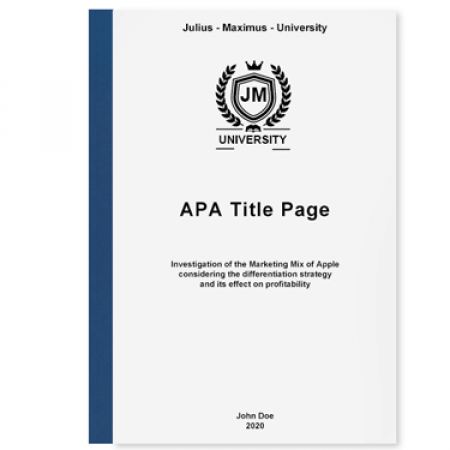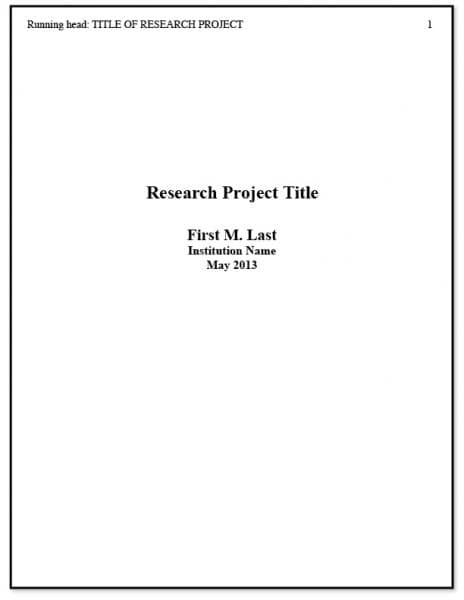
Definition: APA Title Page
An APA title page, which is placed at the front of your dissertation or academic work, should be concise and immediately guide the reader towards understanding what the purpose and trajectory of your research is about. An APA title page differs from a cover page as a cover page is often placed in front of the title page and is of a harder material; however, the APA title page comes immediately after the cover page and it consists of all of the relevant information about the document.
Completing your work with an APA title page is not only informative for the reader but also for presentational purposes. An APA title page title page creates dissertation structure by condensing your research and findings and demonstrating this through a direct APA title page.
When producing a dissertation or an academic piece of work, it is requisite to include a clear title page that shares what the piece and topic is about. For useful pointers about what your APA title page should include and guidance about how it should be written, structured, and formatted, read-on for pertinent tips and information.
FAQ's
In order to produce a clear structure, the APA title page should consist of a running header with page numbers; it should state the author’s name and the name of the institution that the thesis or other piece of academic writing is being submitted to. Some APA title pages may include other aspects like author’s notes, however this depends on the institutions.
Similarly to most other style guides, APA does use a title page at the beginning of a research paper, academic essay or dissertation. The main purpose of the APA title page is to state the project title, the name of the author, and the name of the institution that the work is being submitted to. Don’t confuse the title page with the cover page! The cover page is included after the title page and some methods of formatting do not require a cover page.
Similarly to a cover page, an APA title page should include the main components such as a running header, page number and the title of the essay. In Microsoft Word packages, you will be able to select formatting options, then the running header and the margin should be one inch from the top of the page. APA also requires a cover page, but if you’re using another formatting method, check with your institution regarding a cover page.
The length of your thesis title should not be more than twelve words. Additionally, based on APA’s style guide, words with contractions or abbreviations should not be shortened. All of the requirements for the cover page will be unlikely to exceed 70 words. However, there is no specific word count for a title page, you simply need to include the information that is required.
When you produce your APA title page, you should adhere to using the ‘Times New Roman’ font and the text size 12pt. The title should also follow the ‘case capitalization’ methods for ‘title case’ and ‘sentence case’. More information about these rules can be found in the APA citation style guide. Your running header will also be displayed in capital letters.
All Important Components
There are four main components of an APA title page and these consist of the running header – which also includes the page number; the title of the paper; the name of the author; and the name of the institution.
Some APA title pages also include an additional component such as an author’s note. This information may include contact information, links to specific departments, or any other information that has been advised to be included. Often, a professor or teacher of the class will advise about whether this needs to be provided.
Examples
The purpose of an APA title page is to convey the primary idea of your dissertation or academic work. An APA title page conveys content in a concise and transparent way so the information is to-the-point and does not include any erroneous words.
Visually, the content on the APA title page should also be easily accessible and direct and this is achieved by utilizing double-spacing and refraining from underlining or emboldening any of the text.

APA Title Pages and Other Style Guides
The reason behind why the APA title page needs to be so distinctive and clear is that it provides the reader with the opportunity to immediately gain an idea of what the research will discuss and whether this is relevant to the reader’s interests or own research.
Also, it is important to recognise that different referencing styles have various rules that are better suited to the academic discipline that they are supporting. The style guide of APA, which stands for American Psychological Association, is known for being used in the field of psychology and the social sciences.
Unlike some other more style guides such as MLA that are often applied to subjects in the arts and humanities and can be extremely comprehensive, APA is renowned for its clarity and concise style. This is demonstrated by the use of punctuation in the references such as commas between details and a full-stop after page numbers. One significant difference between MLA and APA is that APA includes the publication date: this is because in the field of psychology, it is fundamental for this type of information to be retained and applied.
APA for Your Thesis
Due to the strict word count of the title on your APA title page, this contributes to making your APA title page easily understood and it specifically conveys what your topic and research is about.
When you are producing a bachelor or master thesis, you are often covering new information and research that can be unknown to the reader; therefore, it is important the Apa fulfills the role of conveying the purpose and intentions of your research in a manageable way.
In a Nutshell
Overall, an APA title page is the ‘first glance’ that your professor or researcher will have to access to. The aim that you want to accomplish is to follow the APA guidelines to create a well-structured APA title page. It should be set-out in an aesthetically clear way along with a ‘no-nonsense’ title that compliments and enhances the time and effort that you have put into your research.
If you are familiar with a different style guide, it make take some time to make some adjustments; however, you can be assured that when carrying out research under the discipline of social sciences and psychology, the APA style guide will present your findings in the most suitable way. Once you have compiled your research and presented it with an APA title page, if you still feel unsure about whether you have presented the information in the correct manner, use these final tips to check your work over:
- APA citation machine
- Spell and grammar check in Microsoft packages or other online tools
- Proofread your work
- Have a friend scan your work over
